Alicia Girón González is the past president of the International Association for Feminist Economics (IAFFE), her tenure was 2014 to 2015. Girón has also served as director of Universidad Nacional Autónoma de México's (UNAM) Economic Research Institute (IIEc).
Omar Acha is an Argentine historian and political essayist. He is a researcher at the Consejo Nacional de Investigaciones Científicas y Técnicas and also at the Centro de Investigaciones Filosóficas (Argentina). He teaches Philosophy of History at the Universidad de Buenos Aires. He was also a member of the editorial board of Herramienta. Revista de Teoría y Crítica Marxista, published in Buenos Aires.
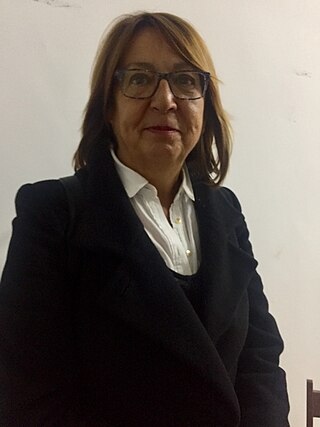
Rocio de la Villa is a Spanish university professor, art historian, curator, researcher and art critic. She has edited and collaborated in the edition of distinct catalogues and publications related with the art and the position of the woman in the artistic world. In 2014 she was rewarded with the Prize MAV in the modality of Criticism of art. She also goes by the names Rocio de la Villa Ardura and Rocio Villa-Ardura.
Hilda María Herzer was an Argentine sociologist, environmentalist and professor. She was a researcher with FLACSO, and visiting professor at Universidad Nacional del Litoral.

#NiUnaMenos is a Peruvian group against femicides and violence against women in the Andean country. The movement was formed in July 2016, and the march it staged in August 2016 has been characterized as the largest demonstration in Peruvian history
Gladys Ethel Parentelli Manzino is a Uruguayan feminist theologian and photographer who has lived in Venezuela since 1969. A representative of Latin American ecofeminism, she was one of three Latin American women appointed by Pope Paul VI as observers at the Second Vatican Council.
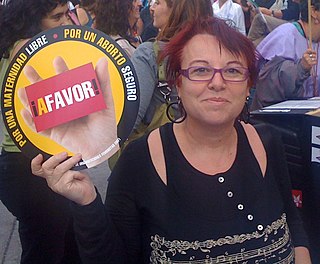
Montserrat Boix Piqué is a Spanish journalist, considered among the most influential women in her country. In early 2000, she created and developed the concepts of social cyberfeminism, and a year later those of feminist hacktivism. Another of her main areas of work is gender violence and communication. She has also stood out as a defender of the right to communication and citizenship rights for women. Since 1986, she has been a journalist for the Information Services of Televisión Española (TVE), in the international section.
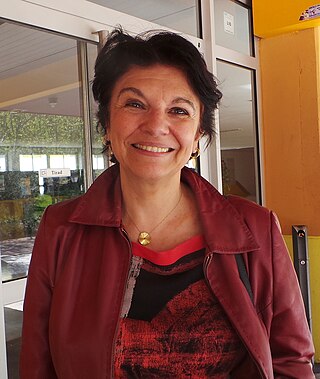
Soledad Murillo de la Vega is a Spanish feminist sociologist, researcher, and politician. Since 9 June 2018 she has been the Secretary of State for Equality in the government of Pedro Sánchez. From 2004 to 2008 she was the Secretary General for Equality of Spain's Ministry of Labor and Social Affairs, occupying the top political position in matters of equality in the government of José Luis Rodríguez Zapatero. From 2009 to 2013 she was part of the United Nations' Convention on the Elimination of All Forms of Discrimination Against Women (CEDAW) Committee, and from 2011 to 2015 she was a member of the City Council of Salamanca for the Spanish Socialist Workers' Party (PSOE).

Laura Nuño Gómez is a Spanish political scientist, researcher, and feminist activist. She is director of the Gender Studies Chair of the Institute of Public Law and the Gender Equality Observatory at King Juan Carlos University (URJC), as well as the creator of the first academic degree in Gender Studies in Spain, and of various postgraduate programs in this subject. She is the author of El mito del varón sustentador, as well as about 30 articles and books about her research. Since the enactment of the Law for Effective Equality of Women and Men, she has been one of the three expert members of the State Council for the Participation of Women.
Margarita M. Birriel Salcedo is a tenured professor in the Department of Modern and American History at the Faculty of Philosophy and Letters of the University of Granada. She is an expert in women's history and women's studies.

Rosa Cobo Bedía is a Spanish feminist, writer, and professor of sociology of gender at the University of A Coruña. She is also the director of the Center for Gender Studies and Feminists at the same university. Her main line of research is feminist theory and the sociology of gender.

Laura Malosetti Costa is a Uruguayan-born Argentine social and cultural anthropologist, researcher, art historian, and essayist. She is also a curator of art exhibitions and the author of several books on Latin American art. She was recognized with the Konex Award in 2006 and 2016.

Dora Beatriz Barrancos is an Argentine researcher, sociologist, historian, feminist, and politician.
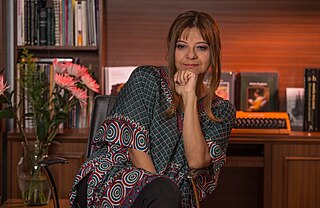
Isabel Agatón Santander is a Colombian poet, lawyer, writer and feminist. Promoter of the Rosa Elvira Cely Law which defines femicide as a crime in Colombia, she integrated the editorial commission of Law 1257 of 2008 about violence against women. She was a judge in the Tribunales de Conciencia de Justicia Para las Mujeres in Nicaragua (2015) and El Salvador in which they tried cases of sexual violence and femicide convened by the Red Feminista frente a la Violencia contra las Mujeres (REDFEM) and the Red contra Violencia of the respective countries.
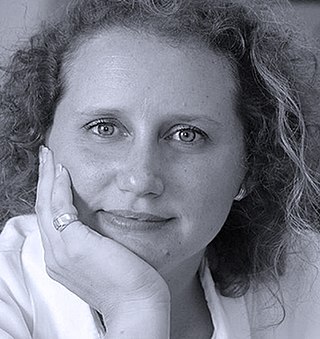
María Fernanda Beigel is an Argentine sociologist and scientist who develops her research at the crossroads between Bourdieu's reflexivity and the Latin American historical-structural tradition.

Paola Andrea Onzaga Franco is a Colombian lawyer who works in women's empowerment, mainly in the scopes of political decision-making and representation.

Spain's National March in Opposition to Male Violence(s) Against Women, also known as 7N, was a mass citizen mobilisation, convened as a "feminist movement", which came to occupy the centre of Madrid on 7 November 2015. Organised by three hundred and thirty-two feminist organisations, it had the support of two hundred and twenty-two bodies, including political parties, unions and national and international feminist organisations, as well as one hundred and thirty-five district councils. The final event consisted in the reading of a manifesto compiling the condemnations and demands of the organisations involved, negotiated over nine months through working committees.

Eli Bartra is a feminist philosopher and a pioneer in researching women and folk art in different places of the world, but particularly, in Mexico. She is the daughter of the writers Anna Murià and Agustí Bartra, two Catalan refugees in Mexico.
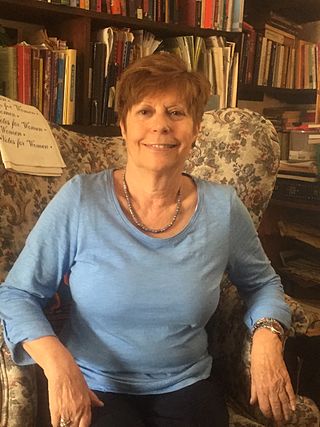
Ana Lau Jaiven is a Mexican feminist, academic and researcher at the UAM Azcapotzalco. She began studying Mexican feminist movements in 1980, and has gone on to study women in the Mexican Revolution, and women's movements and groups throughout 20th-century Mexican history. Francesca Gargallo places her in a group of Latin American feminist historians alongside Julia Tuñón, Ana Arroba, Edda Gabiola and Araceli Barbosa.

Mirta Zaida Lobato is an Argentine historian, essayist, and full professor specializing in the social, cultural and political history of the world of work and gender relations in Argentina and Latin America in the 20th century. Lobato was the founder of "Área Interdisciplinaria de Estudios de la Mujer" (AIEM). She was awarded a Guggenheim Fellowship in 2006.
















